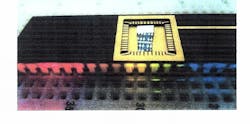Auburn University licenses zinc-oxide radiation-hardened thin-film transistors for space applications
AUBURN, Ala. – Space electronics experts at Auburn University in Auburn, Ala., are licensing zinc-oxide thin-film transistors technology from Intellectual Property Developers (IPD) LLC in Independence, Mo., for radiation-hardened applications in space.
Auburn University has licensed to IPD exclusive rights in the company's patented zinc-oxide transistor technologies because of the resistance of these components to the radiation experienced in space, Auburn officials say.
Crewed spacecraft and satellites, as a result, may be able to use less radiation shielding of these electronic components, resulting in lighter, more fuel-efficient vehicles and more reliable systems that could enhance national security, university officials say.
Given the focus on deep-space exploration and travel, these components and their benefits could be of great value to federal agencies such as the U.S. Department of Defense (DOD) and National Aeronautics and Space Administration (NASA).
Potential DOD and NASA applications of the IPD zinc-oxide radiation-hardened electronics components may help ensure national security and returning to the moon via the Artemis campaign, exploring Saturn’s and Jupiter’s moons via the Dragonfly and Europa Clipper campaigns, and development of exploration systems that tie into these and other campaigns such as Mars Sample Return and Orion campaigns, university officials say.
This technology is a dual-use innovation, benefiting the government and civilian sectors. Aside from space travel, these electronics can provide similar benefits and potential increased longevity for the International Space Station and satellites important to national security and the Department of Defense that are exposed to radiation for extended periods of time.
Terrestrial aviation, high-energy particle accelerators, nuclear security, and nuclear power generation also could benefit from greater reliability due to system components with greater resilience to radiation exposure.
For more information contact Vincent Salva, president of IPD LLC, by email at [email protected], or by phone at 816-254-6670. The company does not have a website. Also contact Auburn University online at https://cws.auburn.edu/ovpr/.
